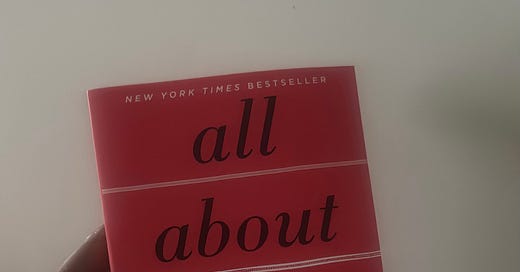When I first read All About Love by bell hooks, I remember feeling cracked open — like someone had finally put words to things I hadn’t dared to admit. But what I didn’t realize then was that healing isn’t a one-time event. It’s a return. A revisiting. A remembering.
Lately, I’ve been coming face to face with parts of myself that I thought were long healed – or at least dormant. Triggers in my relationships. Moments of unexplainable withdrawal when I most wanted to reach out. A tightness in my chest when someone tries to love me in a way I don’t yet know how to receive. But I can so freely give that same love.
It’s become clearer that what I’m dealing with isn’t just “communication issues” or “bad timing.” It’s the residue of lovelessness — from childhood, from silence, from what was withheld and what I told myself I didn’t need. While it wasn’t “normal” and didn’t feel ok, I told myself that I would be ok. And now it shows up in how I try (and sometimes fail) to give and receive love. Sometimes it’s too little with a fear of being overbearing or sometimes too much with a fear of not showing enough.
I did mention I’m a bibliophile, right? So it’s not unusual for me to dig through one of my many book bins just because. I wasn’t looking for anything in particular when I pulled out All About Love. Not to find new answers, but to ask better questions. To revisit it with a fresh eye and tend to a layer of healing I didn’t even realize still needed attention — stirred up by a recent trigger (or maybe a full-on crash out). To sit with younger versions of myself who, I now understand, have been quietly waiting to be held.
bell hooks wrote, “Rarely, if ever are any of us healed in isolation. Healing is an act of communion.” And this time around, I’m not reading just for me — I’m reading for all the versions of me that thought love had to be earned, proven, and well sometimes even performed.
This books helps me name what I’m feeling. It reminds me that love is a practice, not just a feeling. That healing from lovelessness takes patience, language, new approaches, and community. That it’s okay to admit, even while pushing 30, that I’m still learning how to love and be loved well.
And maybe that’s what it means to grow: not to arrive at some healed, whole version of myself — but to keep returning to the work. To the pages. To the truth.
bell hooks is one of my truth-tellers. And All About Love is a book work revisiting again and again
If you’re new to bell hooks — and you’ve been wondering why her name is always lowercase, just like I did the first time I picked up one of her books — here’s what I’ve learned.
She chose to stylize her name in lowercase not out of error or aesthetic, but as a political and artistic choice. It’s a refusal to center the self over the work. She wanted the substance of her words, not her name, to hold the weight. The name itself is a tribute to her great-grandmother, Bell Blair Hooks. The lowercase is a reminder that theory, memory, and language can belong to the collective, not just the individual.
As an artist and a person in constant conversation with my past, I hold onto that. The idea that our names are portals, not platforms. That humility and conviction can coexist. That our work can speak louder when we step out of its way, even just a little.
bell hooks did that. And I’m still learning from her choice to move differently — in language, in love, and in liberation.
Thanks for reading! I’m a bibliophile, artist, curator and deep feeler figuring it out in real time through books, art, memory, and the mess of healing. If you’re into honest reflections, creative process, and the kind of storytelling that makes you feel less alone, I’d love to have you here. Subscribe to walk with me through what I’m reading, creating, unlearning, and slowly growing into.




